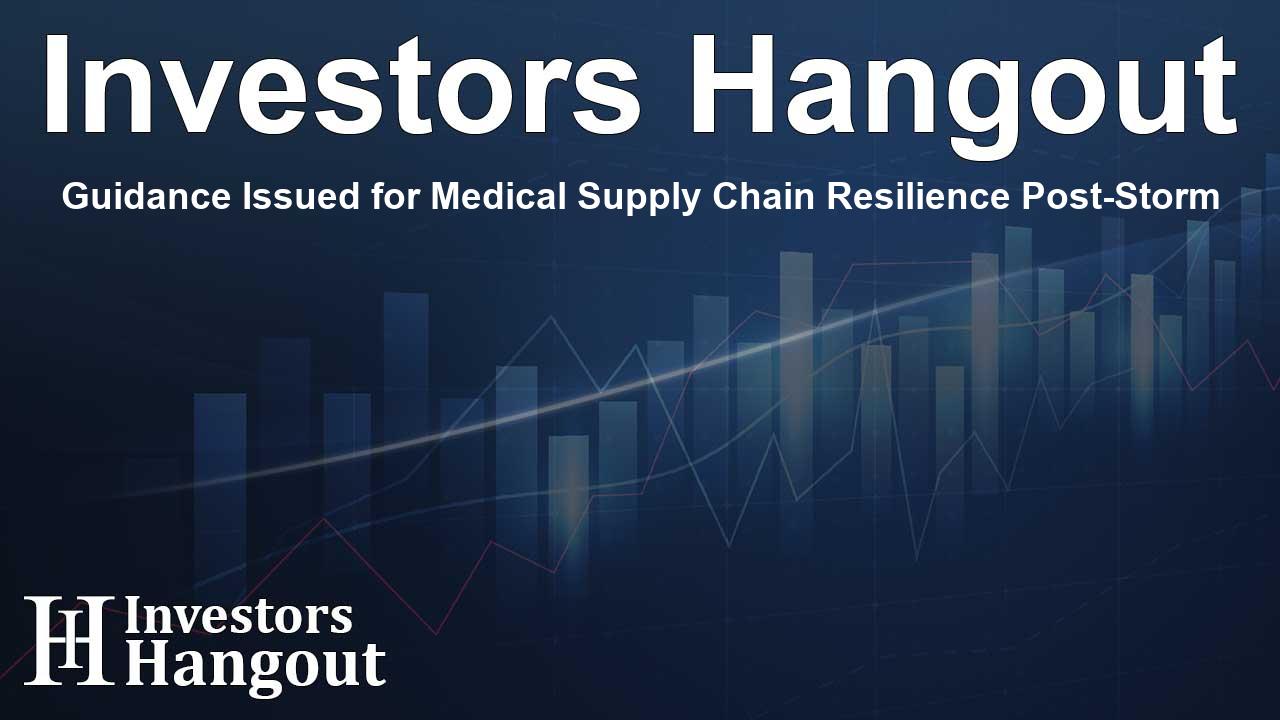Guidance Issued for Medical Supply Chain Resilience Post-Storm

Guidance for Navigating Medical Supply Chain Disruptions
The supply chains essential for healthcare could face shortages and inefficiencies in light of recent events affecting the southeast U.S. Notably, Hurricane Helene has caused significant damage, and the international dockworker strike is further complicating the situation. ECRI, renowned for its commitment to healthcare quality and safety, is at the forefront of monitoring these impactful changes and has released vital resources aimed at healthcare leaders.
Hurricane Helene's Impact on Healthcare Supply Chains
The unfortunate aftermath of Hurricane Helene includes disruptions at critical supply points. One significant incident involved a Baxter International Inc. facility, which halted production due to hurricane-related damage. This has raised concerns about the availability of crucial medical supplies such as normal saline, dialysis solutions, and intravenous (IV) products that are fundamental for patient care.
Understanding the urgency of this situation, ECRI has published an analysis geared towards assisting healthcare providers in navigating these supply constraints. This report details alternatives for affected IV and irrigation solutions, identifying up to three equivalent products from other manufacturers that can mitigate immediate shortages.
Support for Healthcare Providers
Amidst the chaos caused by Hurricane Helene, ECRI expresses its heartfelt solidarity with those impacted by the storm. Tim Browne, Vice President of ECRI's Global Supply Chain Solutions, emphasized the organization's commitment to supporting healthcare staff and frontline workers who are continuously dedicated to providing care in regions most severely affected.
Impact of Ongoing Dockworker Strike
In addition to the hurricane's destruction, a strike by U.S. dockworkers associated with the International Longshoremen's Association has commenced, which could obstruct the flow of multiple goods across nearly all cargo ports. This strike poses further threats to the availability of numerous supplies, including essential medical products. Though the full extent of its impact remains uncertain, experts from ECRI anticipate significant disruptions, particularly concerning imported goods and raw materials critical for healthcare delivery.
“Our team is actively assisting our supply chain partners by supplying the data-driven insights necessary to ensure that patients continue to receive the safest and most effective care during these challenging times,” Browne added. ECRI's outreach to clients aims to facilitate resource availability and alleviate potential shortages amidst these disruptions.
Preparing for Future Challenges
The integrated response from ECRI not only aims to address immediate challenges posed by supply shortages but also prepares the healthcare industry for potential future disruptions. By equipping healthcare facilities with crucial information and alternative solutions, ECRI strives to maintain an uninterrupted supply of necessary medical products, ensuring that facilities are well-stocked and ready to provide life-saving care.
About ECRI
ECRI is an independent, nonprofit organization committed to enhancing the safety, quality, and cost-effectiveness of healthcare. With an unwavering focus on technology evaluation and patient safety, it is regarded as a trusted resource by healthcare leaders and agencies globally. ECRI is recognized as an Evidence-based Practice Center by the U.S. Agency for Healthcare Research and Quality and has made significant strides in healthcare safety through its initiatives, including acquiring the Institute for Safe Medication Practices in 2020 to become one of the largest healthcare quality and safety entities internationally.
The mission of ECRI remains to foster improvements in healthcare practices that ultimately enhance patient outcomes, translating into better safety and quality across all healthcare systems.
Frequently Asked Questions
What is the purpose of ECRI's recent report?
ECRI's report is aimed at helping healthcare providers manage supply chain shortages resulting from Hurricane Helene and the ILA strike, offering alternative solutions for critical medical supplies.
How has Hurricane Helene affected medical supplies?
Hurricane Helene caused damage to production facilities, particularly a Baxter plant, leading to shortages of key products necessary for patient care, such as IV solutions and dialysis supplies.
What is the significance of the dockworker strike?
The International Longshoremen's Association strike may halt the movement of goods across several ports, further complicating the availability of medical supplies and materials.
How is ECRI assisting healthcare providers during this crisis?
ECRI is collaborating with healthcare facilities, providing insights and alternative product recommendations to help maintain essential supplies for patient care amidst disruptions.
What is ECRI's overall mission?
ECRI is dedicated to improving healthcare safety, quality, and cost-effectiveness through independent research, practical resources, and by fostering trust in healthcare systems across the globe.
About Investors Hangout
Investors Hangout is a leading online stock forum for financial discussion and learning, offering a wide range of free tools and resources. It draws in traders of all levels, who exchange market knowledge, investigate trading tactics, and keep an eye on industry developments in real time. Featuring financial articles, stock message boards, quotes, charts, company profiles, and live news updates. Through cooperative learning and a wealth of informational resources, it helps users from novices creating their first portfolios to experts honing their techniques. Join Investors Hangout today: https://investorshangout.com/
Disclaimer: The content of this article is solely for general informational purposes only; it does not represent legal, financial, or investment advice. Investors Hangout does not offer financial advice; the author is not a licensed financial advisor. Consult a qualified advisor before making any financial or investment decisions based on this article. The author's interpretation of publicly available data shapes the opinions presented here; as a result, they should not be taken as advice to purchase, sell, or hold any securities mentioned or any other investments. The author does not guarantee the accuracy, completeness, or timeliness of any material, providing it "as is." Information and market conditions may change; past performance is not indicative of future outcomes. If any of the material offered here is inaccurate, please contact us for corrections.